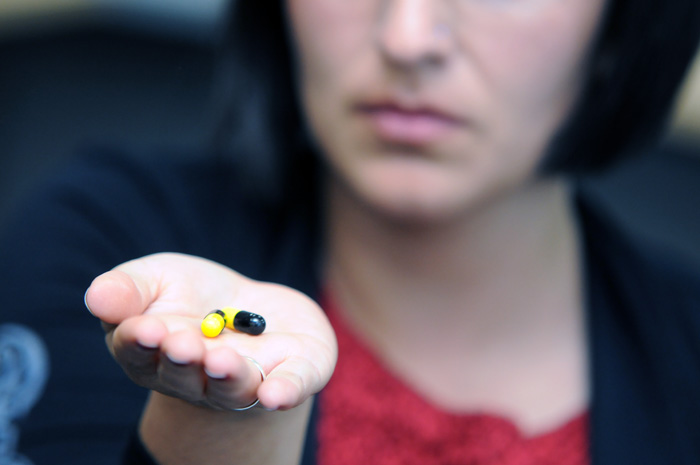Antibiotics are the main drugs used to fight against bacteria that cause infection in the organism, for instance, for the use of catheters, needles and other tools used in the clinical context. They are also used for treating ulcers and virus, among other pathologies.
However, the resistance that microorganisms develop to these drugs (due to their speed and genetic change) makes them lose their effectiveness, generating the need to use higher and stronger doses in their chemical composition and for longer periods of time. This situation was declared by the World Health Organization (WHO) a public health problem since 2008.
Based on this study made by Universidad Nacional de Colombia, the Ministry of Health and Colciencias, it was evident that the excessive use of antibiotics in the country is concerning. In 13 high level hospitals (special to treat severe diseases), the use of carbapenem such as Metropenem (used for severe infections) increased even 300 times, according to Aura Lucia Leal, microbiologists of Universidad Nacional de Colombia and coordinator of the study. This reveals the need to use these antibiotics to fight against the increase of bacterial resistance.
"Options are becoming limited, for this reason doctors are obligated to vary the doses or using different types of antibiotics at the same time to fight against bacteria. This brings other types of consequences." asserted Leal.
In the body, we have millions of bacteria located in the throat, intestines, skin, etc., and we need them because they are a protection mechanism. Antibiotics are not selective and they attack microorganisms indiscriminately, killing those that are beneficial. The result is a process called "selective pressure", that means, the presence of resistant bacteria.
Other consequence was evident with the presence of two of the most dangerous bacteria in the intensive care unit: staphylococcus (present in the mucosa and the skin) increased its mortality level from 46% to 57% while hospitalization periods for patients increased from 26 to 37 days.
For the case of Pseudomona (of in-hospital transition), its increase was from 41% to 61% in mortality, and from 33 to 43 hospitalization days.
Bad use
The inadequate use of these drugs in the community is also a concern. In the study led by Professor Leal, 20% of the patients surveyed (536) had used antibiotics before hospitalization, which calls the attention of the so called "prudent use of antibiotics," for diminishing bacterial resistance.
"It is necessary to prescribe them when the patient really needs them, using diagnosis guides, determining right doses, and accurate use times. From the economic perspective, antibiotics are first in terms of costs in health services, since they are used in high amounts," mentioned the Professor.
Figures reveal reality: in-hospital infections costs to the country close to 727 thousand million pesos each year.
Likewise, the microbiologist of Universidad Nacional de Colombia asserted that in Colombia, people know the antibiotic"s names, especially beta lactam antibiotics (derived from penicillin) such as aspirin, amoxicillin, bactrin, etc., and they used them indiscriminately following instructions from relatives, friends, local drugstores, etc. "when the disease turns serious, people go to hospitals with resistant bacteria that generate complications, not only for them, but for other patients," asserted Leal.
Roberto Tamara, physician of the infectious disease unit at San Ignacio Hospital, highlights other elements that influence the prescription of antibiotics: the expectations of the patient for receiving the drugs the day of the consultation (it is very frequent during holydays), distortion of the disease (exaggeration of the symptoms), among others that are mention in the report Psychosocial factors that influence the prescription of antibiotics, non pharmacological bases of therapy.
Washing hands is effective to control infections
Among the recommendations of the WHO to control the dissemination of resistant bacteria, the Ministry of Health "along with other specialized research groups, like that led by Doctor Aura Lucía Leal and Carlos Arturo Álvares, associate professor o Universidad Nacional de Colombia- insists that washing hands is the simplest and most effective method to control this problem.
"Since the 19th century, Iganz Semmlewis observed that obstetric mortality was higher in patients attended by medicine students that came directly from the morgue, with a disgusting smell on their hands. When he demanded them to wash their hand with a chloride solution, maternal mortality decreased from 13% to 2%, explains Álvarez. However, despite of specific studies that highlight this action as a measure to prevent the proliferation of bacteria, sometimes even among doctors, this disposition is rejected.
Since creating new molecules to fight against resistant bacteria is impossible, and minimizing its dissemination in clinical and communitarian environment is difficult, expert consider necessary to use measures to prevent the increase of resistance, based on the existing possibilities.
 Correo Electrónico
Correo Electrónico
 DNINFOA - SIA
DNINFOA - SIA
 Bibliotecas
Bibliotecas
 Convocatorias
Convocatorias
 Identidad UNAL
Identidad UNAL





